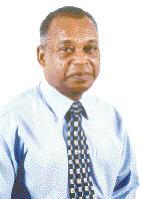
Tony Becca
ACCORDING TO the ICC, Darrell Hair will umpire no more.
According to the game's ruling body, it has lost confidence in the big Australian and, because of that - contract or no contract, it simply could not have him officiating in Test matches - not even those played in Pakistan or those not involving Pakistan.
The ICC's decision follows the ball-tampering controversy at The Oval in August which led to the abandonment of the Test match between England and Pakistan. The not guilty verdict for Pakistan captain Inzamam-ul-Haq, who was accused of refusing to take the field and of therefore bringing the game into disrepute, and a motion moved by Pakistan, India, Sri Lanka and Bangladesh took place at the ICC's board meeting in Mumbai earlier this month.
Unfair
The motion accused Hair of being unfair, as an umpire, to Pakistan in particular and to Asian countries in general, and after the motion, which was to ban Hair was discussed, a vote was taken.
According to the reports, Pakistan, India, Sri Lanka, Bangladesh, South Africa, Zimbabwe and the West Indies voted in favour. England, Australia and New Zealand voted against.
According to some people, the ICC, which had earlier said it had all faith in Hair and in his integrity to protect the game, abandoned the Australian and left him to swim or sink.
Based on the fact that a vote was conducted, however, and that the vote was 7-3 against Hair, it does not seem that the ICC abandoned the man which, it has since been released, was voted number two umpire in the world by the ICC a few days before The Oval incident and the 'Umpire of the Year' a
few days ago by readers of
the prestigious Wisden Cricket Monthly.
There are two things that seem more plausible.
The first one is that with Pakistan, India, Sri Lanka, Bangladesh, South Africa, Zimbabwe and the West Indies mostly black countries and represented by blacks, with England, Australia and New Zealand all white countries and represented by whites, all seven countries who voted in favour and all three who voted against, voted along racial lines.
The richest country
With India being by far, probably by as much as four to one, the richest country in the world of cricket and with the Asian block being by far the richest region in the world of cricket; with a region like the West Indies strapped for cash, promised financial help by India, and having promised to work closely with India in that regard, number two may well be that with India's money so much, with so many wanting a share of it, India's money was the real reason for putting Hair in a slow boat to China.
Hair, probably, has now been made to pay for calling Muttiah Muralitharan for throwing back in 1995-96; for labelling, in his
book, Muralitharan's action as "diabolical"; and, for some dubious umpiring decisions against Pakistan.
Apart from the fact that West Indians, right or wrong, will tell you that as far as decisions against the West Indies team are concerned, the worst umpires in the world are from Australia, India and Pakistan, there are many umpires in the world, some numbered among the best, who will tell you that Muralitharan throws but who, as they have done with others around the world, did not call him and will not call him.
Hair, in my, opinion, was wrong for what he did at The Oval - for labelling the Pakistan cricketers and every Pakistani cheats without proof. He could simply have changed the ball, told Inzamam-ul-Haq why the ball was changed and then warned the Pakistani captain.
The laws
Just as when he called Muralitharan for throwing, however, what he did at The Oval was supported by the laws of the game which state that he needs no proof of ball-tampering to act the way he did and even if he could have done it differently, even if he could have considered the repercussions, even if he does deserve to be punished, the question is this: Does he deserve the ultimate punishment, does he deserve to be banned forever for simply being brave enough to carry out the laws of the game?
Unless there was something sinister behind his reported request for US$500,000 to step aside a day or two after The Oval incident, the crime, if it was really a crime, although the laws of the game say it was not, does not warrant such a punishment.
Apart from the possibility of a racial divide, apart from the probability that money swayed the vote that led to the fall of an umpire, as we ponder the Hair controversy, there are two questions which must be asked.
The first one is this: What happens next time around when a country says it is not comfortable with a particular umpire? And remembering that the two umpires in a match are supposed to be equal, the second one is this: was Hair the only umpire in the match at The Oval?
What is really important, however, is that after telling the world that Hair had been banned, Percy Sonn, the president of the ICC, and Malcolm Speed, the chief executive officer of the ICC, were bold enough to also tell the world that the ban had nothing to do with what happened at The Oval.
The final question is this: if it did not, what did?

